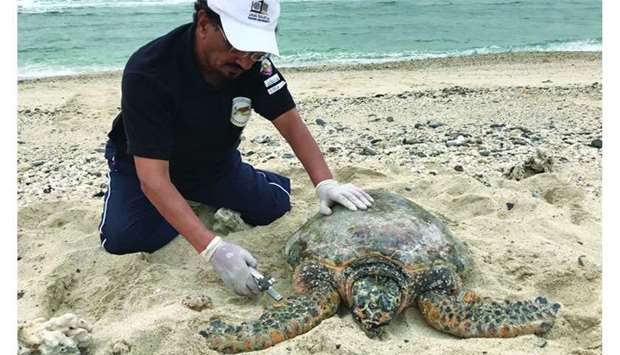With funding from Qatar Petroleum (QP), the Environmental Science Center (ESC) at Qatar University is currently implementing a project to protect hawksbill turtles.
The project is led by the ESC director Prof Dr Hamad bin Abdulrahman al-Saad al-Kuwari with a specialist’s team and technicians, according to a statement.
Since the beginning of 2002, the two institutions have been studying the hawksbill turtles in the Qatari coasts, filling the gap in information available to them and working to restore the turtle populations and their habitat based on the best scientific evidence. The study of the hawksbill turtles this year includes the study of nesting beaches of Fuwairit, Al Mafyar, Al Ghariyah, Al Maroona and Al Huwailah. These beaches were supervised by a scientific team from the ESC in co-operation with a team of observers from the Ministry of Municipality and Environment.
In addition, the study of hawksbill turtles included four Qatari islands, including the faraway islands of Halul and Sharaouh and the nearby islands including Umm Tais, and Ras Rakkan.
The island study is implemented and supervised by a specialist team led by the ESC’s field director Dr Jassim Abdulla A al-Khayat. “This year, for the first time, the project included the deployment of satellite transmitters on a number of hawksbill turtles in Halul Island to track their movements and behaviour in the Gulf," said ESC researcher Shafeeq Hamza, who has been working with the Qatar Turtle project since 2009. The nesting beaches in Halul Island are well-fenced and guarded by the Halul offshore management.
Sea turtles are a group of reptiles that have adapted to live in the sea and are one of the most ancient creatures on earth. They have been able to outlive dinosaurs and there are currently seven species in the oceans, the statement added.

